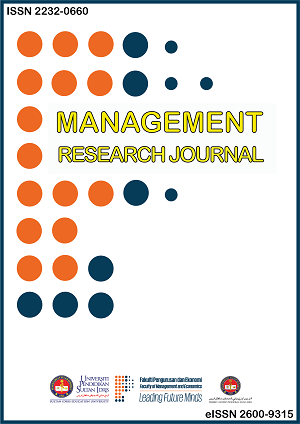Factors Influencing Academic Staff's Intention to Invest in Financial Markets: Extending the Theory ofReasoned Action
DOI:
https://doi.org/10.37134/mrj.vol13.2.9.2024Keywords:
investment intention, theory of reasoned action, financial awareness, academic staff, behavioral intentionAbstract
This study aims to understand the factors influencing investment intentions among Sultan Idris Education University (UPSI) academic staff by extending the Theory of Reasoned Action (TRA) with knowledge and awareness variables. A quantitative survey design was used, collecting data from 300 randomly selected respondents via Google Forms. The data were analyzed using exploratory factor analysis, Pearson correlation, and multiple linear regression (MLR) with SPSS version 26.0. The findings show that attitude, subjective norms, knowledge, and awareness significantly relate to investment intentions. Pearson correlation analysis revealed strong relationships between attitude and investment intention (r = - 0.437, r = - 0.437), subjective norms (r = 0.439, r = 0.439), and awareness (r = 0.689, r = 0.689), while knowledge showed a weaker significant relationship (r = - 0.215, r = - 0.215). Multiple linear regression confirmed that these factors are primary predictors of investment intention, with awareness exerting the strongest influence (β = 0.554, p<0.01, β = 0.554, p<0.01). The study suggests that increasing awareness and knowledge about investments can positively influence academic staff's investment intentions, highlighting the need for enhanced education and awareness initiatives. It contributes empirically to consumer behavior literature in investment contexts, offering insights for investment service providers, policymakers, and investors. Additionally, it makes theoretical contributions by illustrating how knowledge and awareness influence investment intentions, helping policymakers develop policies that enhance financial literacy and support informed investment decisions.
Downloads
References
Abildinova, G., Assainova, A., Karymsakova, A., Abykenova, D., & Temirkhanova, M. (2024). Transforming High School Education with Digital Tools: A Systematic Review. International Journal of Learning, Teaching and Educational Research, 23, 668–694. https://doi.org/10.26803/ijlter.23.8.34
Aksoy, C. (2025). Building Effective Cyber Security Leadership: The Crucial Role Of Leaders In Prote Abdel Ghany, H. (2023). Applications and Analysis of Expert Systems: literature review. Benha Journal of Applied Sciences, 8(5), 285–292.
Abdullah, M. S., & Keshminder, J. S. (2020). What drives green sukuk? A leader’s perspective. Journal of Sustainable Finance and Investment, 12(3), 985–1005. https://doi.org/10.1080/20430795.2020.1821339
Agarwal, S., Qian, W., & Tan, R. (2020). Investment. In Household Finance (pp. 139–173). Singapore: Springer Singapore. https://doi.org/10.1007/978-981-15-5526-8_4
Ajzen, I. (2018). Consumer attitudes and behavior. In Handbook of Consumer Psychology (pp. 529–552). Routledge.
Ajzen, I. (2020). The theory of planned behavior: Frequently asked questions. Human Behavior and Emerging Technologies, 2(4), 314–324. https://doi.org/10.1002/hbe2.195
Ayyub, S., Xuhui, W., Asif, M., & Ayyub, R. M. (2020). Determinants of intention to use Islamic banking: Evidence from Pakistan. International Journal of Islamic and Middle Eastern Finance and Management, 13(1), 147–163.
Dawami, Q. (2020). Factors influencing the preference of customers towards Islamic banking: Evidence from Malaysia. Journal of Islamic Economic Laws, 3(1), 48–67.
Elfahmi, R., & Solikin, I. (2020). Model of Student Investment Intention with Financial Knowledge as a Predictor. Dinasti International Journal of Economics, Finance and Accounting, 1(1), 165–175.
Fauzan, N., & Azhar, F. N. (2019). The Influence of Environmental Concern and Environmental Attitude on Purchase Intention Towards Green Products: A Case Study of University Students. International Conference on Public Organization, 1–14.
Giannakopoulou, S., Damigos, D., & Kaliampakos, D. (2018). Hypothetical Bias in contingent Valuation Studies: Evidence from built heritage evaluation. Journal of Environmental Economics.
Hamidi, H., & Chavoshi, A. (2018). Factors for the Adoption of Mobile Learning in Higher Education. Telematics and Informatics, 35(4), 1053–1070.
Hastings, J., & Mitchell, O. S. (2020). Financial Literacy and Retirement Wealth. Journal of Pension Economics and Finance, 19(1), 1–20. https://doi.org/10.1017/S1474747218000227
Housni, S., & Machrafi, M. (2023). Country of Origin Effect on Consumer Behavior: Conceptual Frameworks. Economic and Social Development: Book of Proceedings, 122–132.
Huang, S.-L., & Lin, Y.-H. (2022 Consumer Online Purchase and Search Behavior: FCB Grid Perspective. Asia Pacific Management Review, 27(4), 245–256.
Husin, M. M. (2019). The Dynamics of Malaysian Takaful Market: Challenges and Future Prospects. Journal of Islamic Finance, 8, 131–137.
Longo, C., Shankar, A., & Nuttall, P. (2019). Living a Sustainable Lifestyle: Dilemmas and Paralysis. Journal of Business Ethics, 154, 759–779.
Maryam, S. Z., Ahmad, A., Aslam, N., & Farooq, S. (2022). Attitude and Adoption Intention Among Customers Using TPB. Journal of Islamic Marketing, 13(10), 2090–2107.
Metawa, N., Hassan, M. K., Metawa, S., & Safa, M. F. (2019). Behavioral Factors on Financial Decisions: Egyptian Stock Market Case. International Journal of Islamic and Middle Eastern Finance and Management, 12(1), 30–55.
Nawi, N. C., Mamun, A. Al, Hayat, N., & Yang, Q. (2023). Consumers Attitudes Toward IoT in Fashion. Journal of Ambient Intelligence and Humanized Computing, 1–13. https://doi.org/10.1007/s12652-023-04733-3
Nordin, N., Aziz, M. I., Embong, R., Daud, N., & Aziz, S. A. (2018). Shariah Compliant Gold Investment Among Academicians in Terengganu. International Journal of Academic Research in Business and Social Sciences, 8(10), 226–235. https://doi.org/10.6007/ijarbss/v8-i10/4728
Obaid, M. M., Ibrahim, I., & Udin, N. M. (2020). Zakat and Tax Compliance Behaviour in Yemen. Journal of Advanced Research in Business and Management Studies, 19(1), 1–14.
Ouachani, S., Belhassine, O., & Kammoun, A. (2021). Measuring Financial Literacy: A Literature Review. Managerial Finance, 47(2), 266–281.
Shaikh, I. M., & Noordin, K. (2018) Attitudes Toward Islamic Financing: Comparative Study. Middle East Journal of Business, 13(3), 16–23. https://doi.org/10.5742/mejb.2018.93479
Suzuki, M., & Yamamoto, Y. (2021). Influence of Confirmation Bias on Web Search. Frontiers in Psychology, 12, 1–11.
Widyawati, L. (2020). Socially Responsible Investment and ESG Metrics: Systematic Review. Business Strategy and the Environment, 29(2), 619–637. https://doi.org/10.1002/bse.2393
Wu, W., Huang, V., Chen, X., Davison, R. M., & Hua, Z. (2018). Social Value and Online Social Shopping Intention: The Role of Experience. Information Technology and People, 31(3), 688–711.
Downloads
Published
Issue
Section
License
Copyright (c) 2024 Meor Azim, Mohd Yahya Mohd Hussin, Fidlizan Muhammad

This work is licensed under a Creative Commons Attribution-NonCommercial-ShareAlike 4.0 International License.





